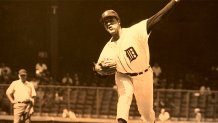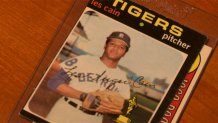Thanks to a journalist 3,000 miles away, Les Cain’s quest for a pension from Major League Baseball is getting a new life. Garvin Thomas reports.
In his Richmond home, 75-year-old Les Cain reaches for a memento from his career in Major League Baseball, pitching for the Detroit Tigers. It’s not an autographed ball or game-worn jersey, however.
It’s a thick stack of legal documents.
"This is really the story," Cain said.
Cain was drafted by the Detroit Tigers out of El Cerrito High School in 1966. The hard-throwing lefthander pitched his way to the Tigers’ major league roster in seemingly no time, making his debut in 1968. But from there, time became a constant issue.

According to Cain, he logged four years of playing time, which includes his time spent on the injured (then called “disabled”) list – enough to qualify for a pension from the league. MLB’s records, though, show Cain coming up short of that magic four-year mark.
His career ended up being cut short by shoulder issues, so Cain returned to Northern California and began careers in banking and public transportation. Still, he continued to fight the league for what he thought he was owed. Cain won a legal battle in the 1970s with Major League Baseball over a workman’s compensation claim, but his claim to a pension dragged on year after year.

"All the time people ask me, 'What? You played baseball wasn't that the greatest thing you ever did?’ No. I drove a bus for 10 years,” said Cain, who now drives a shuttle bus for a Bay Area car dealership.
Local
Get a weekly recap of the latest San Francisco Bay Area housing news. Sign up for NBC Bay Area’s Housing Deconstructed newsletter.
Cain’s inability to obtain a pension isn’t from a lack of trying. He’s contacted several attorneys over the years, but found that, “At every turn, they just turn their back like I didn't even exist.”
Recently, though, help has come for Cain in the form of someone he didn’t even know existed: Doug Gladstone.
Gladstone is s a freelance journalist and lifelong baseball fan living in New York State. In 2010, he published A Bitter Cup of Coffee: How MLB and the Players Association Threw 874 Retirees a Curve. The book delved deeply into a 1980 deal between MLB and the player’s union, which left hundreds of players from Cain’s generation out of the pension program.

Through Gladstone’s research, he discovered Cain’s case. He learned that Cain’s circumstances didn’t put him squarely in the group Gladstone had written about. His case was different but, in Gladstone’s view, more clear-cut.
"'Well, if you're due a pension, what're you waiting for?” Gladstone asked Cain during their first phone conversation. “Why don't you try …’ And he cut me off and said, 'Don't you think I've tried? I've had attorneys look at this for years.”
Gladstone has since done his best to raise awareness about Cain’s case and discusses it any chance he gets with people involved with baseball. He believes Cain is in the right and is owed more than $1.5 million in back pension payments.
NBC Bay Area reached out to Major League Baseball for a comment but did not get a response.

When asked why he’s taken such an interest in Cain’s case, Gladstone quotes the late U.S. Representative John Lewis.
“You know when you see something that isn't right, that's not fair, that isn't just, you have to speak up. You have to say something. You have to do something,’” said Gladstone. “That's why I chose to try to help a man who lives 3,000 miles away from me.”
After all these decades laced with disappointment, Cain finally has an advocate, someone doing his best to help Cain add one more win to his career.
"I thought first of all, ‘He’s crazy!” Cain said. “He doesn't have a dog in this fight, but he did. And that was his compassion.”



